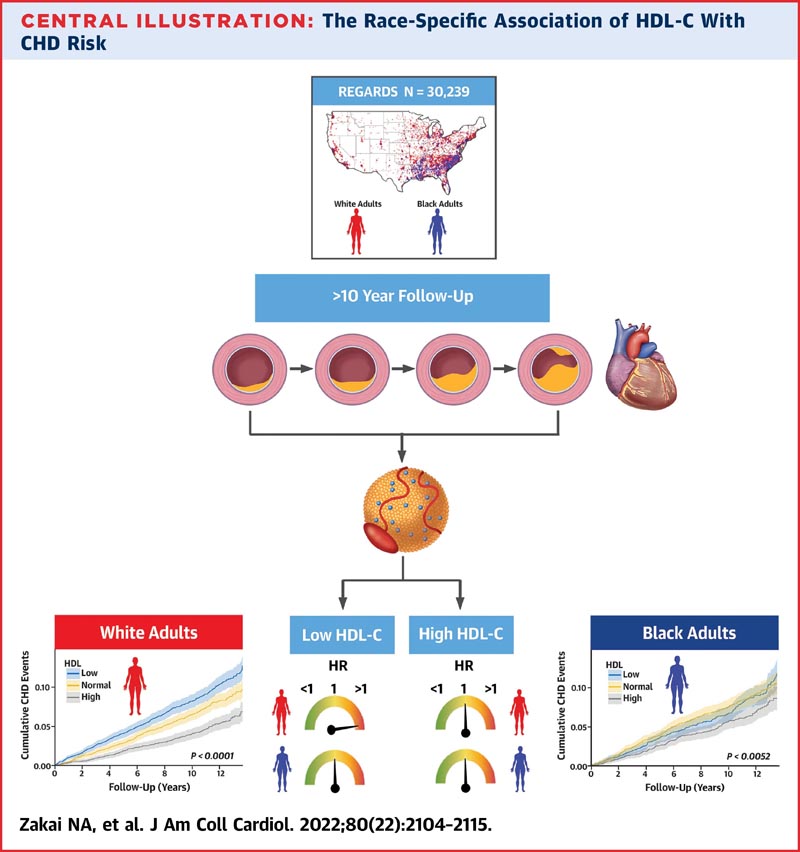Summary Background Plasma lipids are risk factors for coronary heart disease (CHD) in part due to race-specific associations of lipids with CHD. Goals The purpose of this study was to understand why CHD risk equations underperform in black adults. Methods Between 2003 and 2007, the REGARDS (Reasons for Geographic and Racial Differences in Stroke) cohort recruited 30,239 black and white individuals aged ≥45 years from the contiguous United States. We used Cox regression models adjusted for clinical and behavioral risk factors to estimate the race-specific risk of plasma lipid levels with incident CHD (myocardial infarction or death from CHD). Results Among 23,901 participants without CHD (57.8% white and 58.4% women, mean age 64 ± 9 years) during a median of 10 years of follow-up, there were 664 and 951 CHD events among black and white adults, respectively. Low-density lipoprotein cholesterol and triglycerides were associated with increased risk of CHD in both races (P by race interaction > 0.10). For sex-specific HDL-C clinical categories: low HDL-C was associated with an increased risk of CHD in whites (HR: 1.22; 95% CI: 1.05-1.43) but not in black (HR: 0.94; 95% CI: 0.78-1.14) adults (P interaction by race = 0.08); High HDL-C was not associated with a decrease in CHD events in either race (HR: 0.96; 95% CI: 0.79 to 1.16 for white participants and HR: 0.96; 91, 95% CI: 0.74 to 1.12 for black adults). Conclusions Low-density lipoprotein cholesterol and triglycerides modestly predicted CHD risk in black and white adults. Low HDL-C was associated with an increased risk of CHD in white but not black adults, and high HDL-C was not protective in either group. Current risk calculations based on high-density lipoprotein cholesterol could lead to inaccurate risk assessment in black adults. Lower levels of HDL cholesterol were associated with a higher risk of heart attacks in white adults, but not in black adults, and higher levels did not protect either group . |

Comments
A study backed by the National Institutes of Health found that high-density lipoprotein (HDL) cholesterol, often called "good cholesterol," may not be as effective as scientists believed at uniformly predicting cardiovascular disease risk among adults of different racial and ethnic backgrounds.
The research, which was published in the Journal of the American College of Cardiology , found that while low HDL cholesterol levels predicted a higher risk of heart attacks or related deaths for white adults (a long-accepted association) , the same did not happen for blacks. Adults Additionally, higher HDL cholesterol levels were not associated with a reduced risk of cardiovascular disease in either group.
"The goal was to understand this long-established link that labels HDL as the beneficial cholesterol, and whether that is true for all ethnicities," said Nathalie Pamir, Ph.D., senior author of the study and associate professor of medicine. at the Knight Cardiovascular Institute at Oregon Health and Science University, Portland. “It is well accepted that low levels of HDL cholesterol are harmful, regardless of race. “Our research tested those assumptions.”
To do so, Pamir and colleagues reviewed data from 23,901 U.S. adults who participated in the Reasons for Geographic and Racial Differences in Stroke (REGARDS) study. The previous studies that shaped perceptions about "good" cholesterol levels and heart health were conducted in the 1970s through research with a majority of white adult study participants. For the current study, researchers were able to look at how the cholesterol levels of middle-aged black and white adults without heart disease living across the country overlapped with future cardiovascular events.
Study participants enrolled in REGARDS between 2003 and 2007, and researchers analyzed information collected over a 10- to 11-year period. The black and white study participants shared similar characteristics, such as age, cholesterol levels and underlying risk factors for heart disease, such as diabetes, high blood pressure or smoking. During this time, 664 black adults and 951 white adults experienced a heart attack or heart attack-related death. Adults with elevated levels of LDL cholesterol and triglycerides had a slightly increased risk of cardiovascular disease, which aligned with findings from previous research.
However, the study was the first to find that lower HDL cholesterol levels only predicted higher risk of cardiovascular disease in white adults . It also expands on findings from other studies showing that high HDL cholesterol levels are not always associated with a reduction in cardiovascular events. The REGARDS analysis was the largest US study to show this was true for both black and white adults, suggesting that higher than optimal amounts of " good" cholesterol may not provide cardiovascular benefits for none of the groups .
“What I hope this type of research establishes is the need to revise the cardiovascular disease risk prediction algorithm,” Pamir said. “It could mean that in the future our doctors won’t give us a pat on the back for having higher HDL cholesterol levels.”
Pamir explained that as researchers study the role of HDL cholesterol in supporting heart health, they are exploring different theories. One is quality over quantity. That is, rather than having more HDL, the quality of HDL function (picking up and transporting excess cholesterol from the body) may be more important in supporting cardiovascular health.
They are also looking microscopically at the properties of HDL cholesterol, including analyzing hundreds of proteins associated with cholesterol transport and how the various associations, based on a protein or groups of proteins, can improve predictions of cardiovascular health.
"HDL cholesterol has long been an enigmatic risk factor for cardiovascular disease," explained Sean Coady, deputy branch chief of epidemiology within the Division of Cardiovascular Sciences at the National Heart, Lung, and Blood Institute (NHLBI). . "The findings suggest that a deeper dive into the epidemiology of lipid metabolism is warranted, especially in terms of how race may modify or mediate these relationships."
The authors conclude that, in addition to supporting ongoing and future research with diverse populations to explore these connections, the findings suggest that cardiovascular disease risk calculators using HDL cholesterol could lead to inaccurate predictions for black adults.
“When it comes to risk factors for heart disease, you can’t limit them to one race or ethnicity,” Pamir said. “They have to apply to everyone.”
The REGARDS study is co-funded by the National Institute of Neurological Disorders and Stroke and the National Institute on Aging and received additional support from the NHLBI.
Study: Zakai NA, Minnier J, Safford MM, et al. Race-dependent association of high-density lipoprotein cholesterol levels with incident coronary artery disease. J Am Coll Cardiol. 2022; doi: 10.1016/j.jacc.2022.09.027.
















